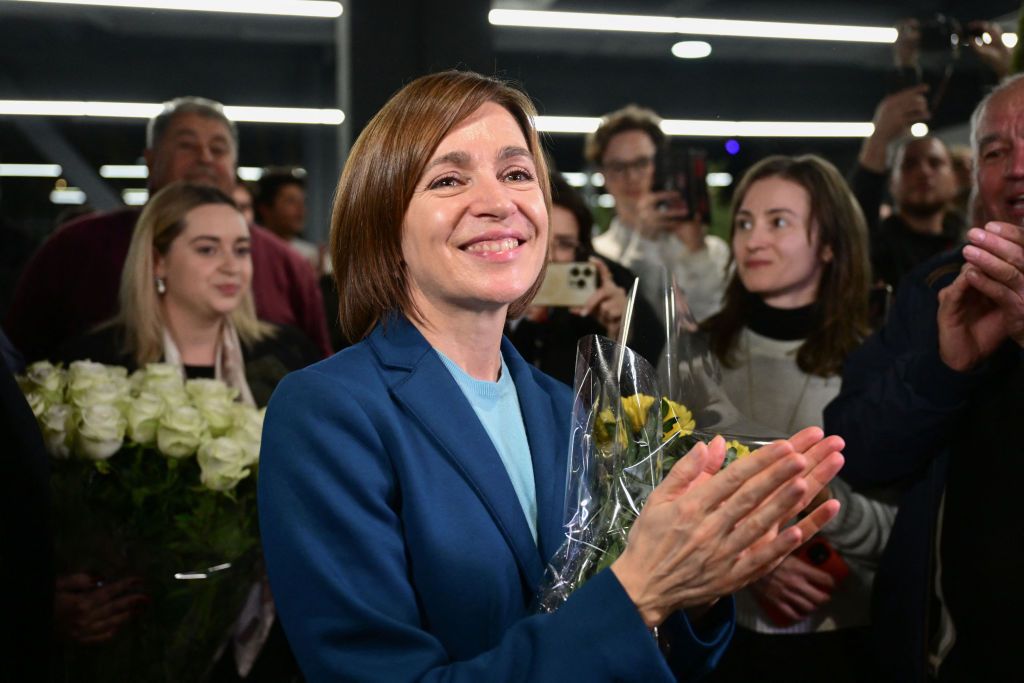In a significant victory for pro-EU factions in Moldova, incumbent President Maia Sandu emerged victorious in the country’s November 3 presidential runoff, defeating her challenger Alexandr Stoianoglo. Sandu won by a margin of about 54% to 45%, with 99% of votes counted. The President emphasized the unity of the people in defeating those who sought to undermine Moldova’s European path, specifically pointing towards Russia as the real opponent. Sandu had long accused the Kremlin of waging a hybrid war to push Chisinau back into Moscow’s orbit, and her victory was seen as a setback for Russia’s attempts to influence Moldova’s elections and squash its EU aspirations.
Sandu’s initial failure to secure a majority in the first round of voting on October 20 came as a surprise to many, particularly as the referendum on enshrining the country’s EU accession path to the constitution only won by a narrow margin. Accusations of electoral fraud and doubts about Sandu’s ability to stay in power added to the uncertainty. Concerns about Russian interference were raised, with allegations of a massive effort to influence Moldova’s elections in favor of Stoianoglo, who had ties to the pro-Kremlin Party of Socialists. Reports indicated that Russian funds were funneled to Moldovan voters, with over $15 million reportedly spent on influencing the election. Sandu and others raised alarms about the malign influence campaign, which involved criminal networks and political groups tied to Russia.
The widespread interference by Russia in Moldova’s electoral process, including bomb threats, cyberattacks, and coordinated voter transport, was a cause of concern ahead of the runoff election. Despite the disruptions, Sandu emerged as the clear winner, securing a decisive victory despite the challenges. Sandu’s victory was seen as a significant triumph for democracy and a demonstration of the will of the Moldovan people to resist external interference in their electoral process. The President’s resounding win underscored the support for Moldova’s European path and signaled a setback for Moscow’s attempts to exert control over the country.
Sandu’s accusations against the Kremlin were not new, as she had previously alleged Russian attempts to destabilize Moldova and overthrow the government. The election victory in 2023 was seen as a turning point in Moldova’s relations with Russia, with Sandu’s pro-Western stance posing a challenge to Moscow. The President had warned of Russian plans to change the legitimate power in Moldova to one that would be at Russia’s disposal, halting the country’s European integration process. A leaked Russian government document outlined a 10-year plan for Moldova that envisioned increased Russian control and influence over the country by 2030. Despite the victory, concerns remained about Russia’s ambitions in Moldova and the potential for further interference to destabilize the country and reverse its progress towards Europe.
The results of the Moldovan election and referendum, which saw a clear victory for Sandu despite Russian interference, highlighted the determination of the Moldovan people to resist external influence and uphold their democratic principles. The pro-European sentiment in the country was reaffirmed by the electoral outcome, with support for Moldova’s EU aspirations remaining strong. The challenges posed by Russian interference underscored the need for vigilance and unity in defending Moldova’s sovereignty and democratic processes. Sandu’s win was a testament to the resilience of the Moldovan people in the face of external threats and a reaffirmation of their commitment to a European future.
Looking ahead, the aftermath of the election victory raised questions about Moldova’s future trajectory and its relationship with Russia. Sandu’s administration faced the daunting task of addressing the challenges posed by Russian interference and continuing to advance Moldova’s European integration process. The President’s resounding win signaled a shift in Moldova’s political landscape and a commitment to upholding democratic values and principles. Despite ongoing concerns about Russian ambitions in the region, Sandu’s victory was seen as a significant step towards solidifying Moldova’s position as a pro-European nation and reaffirming its commitment to a path of progress and prosperity.


